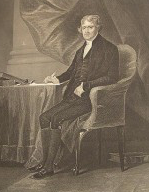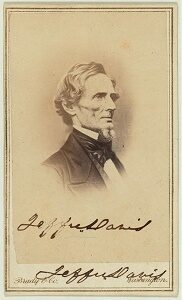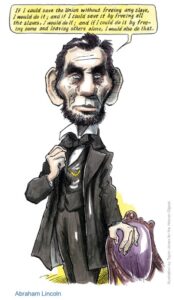“It is the manners and spirit of a people which preserve a republic in vigor. A degeneracy in these is a canker which soon eats to the heart of its laws and constitution.“ ~ Thomas Jefferson, Notes on the State of Virginia, Query 19

I would hope, although I can’t be absolutely certain, that people today know why we celebrated that holiday at the beginning of last month on July 4th; although to be truthful, there isn’t much to celebrate now. If you were to say independence, you’re getting close, but not quite there yet. The holiday we just celebrated was in honor of those who ‘declared’ their independence; they still had to fight a war to obtain it.
Yet history shows that, even though the Declaration of Independence had been written and signed, there were still those who remained loyal to the British Crown. Some of them were so upset over the course their countrymen had taken that they boarded ships and headed back to England. Others stayed in the Colonies and either took up arms against their countrymen, or they aided the British by spying upon the activities of those seeking their independence.
The point I’m trying to make is, support for independence was not unanimous; there were those who still felt loyalty to the existing system of governance and they did what they could to preserve it; even though it was guilty of violating their rights as freemen. If that sounds familiar I’ll get to why in a bit.
There is a question we must ask ourselves though; the Colonists had lived under British rule for well over a century; why did they then decide, in 1776, to sever the bonds that had held them bound to England as British Colonies; why did they seek INDEPENDENCE? I can’t speak for anyone else, but back when I was a kid making my way through school I was taught that one of the grievances the Colonists had was ‘taxation without representation.’ It wasn’t so much the taxes themselves, although they were egregious in the eyes of the Colonists, it was the fact that they were not represented in the government that had imposed them – they did not have a single representative in either House of Parliament.
Those seeking their independence felt that they could not preserve and protect their rights and their liberty against a government they had no say in; which leads us into a discussion of self-governance. The Colonists, at least those actively fighting for independence, felt that the only way to preserve and protect their rights and liberty was to be able to govern themselves. One of the grievances leveled against King George III in the Declaration of Independence was, “He has dissolved Representative Houses repeatedly, for opposing with manly firmness his invasions on the rights of the people.”
 The Declaration of Independence makes two points abundantly clear. The first is that for any government to be just it must have the consent of the governed. The second, and this is possibly even more important, is that for any government to be just it must seek to preserve and protect the rights of life, liberty and the pursuit of happiness. It also states that should a government not serve those purposes it is the right of the people to alter or abolish it. Talk like that will get you accused of treason or sedition today; yet those are the principles this country was founded upon.
The Declaration of Independence makes two points abundantly clear. The first is that for any government to be just it must have the consent of the governed. The second, and this is possibly even more important, is that for any government to be just it must seek to preserve and protect the rights of life, liberty and the pursuit of happiness. It also states that should a government not serve those purposes it is the right of the people to alter or abolish it. Talk like that will get you accused of treason or sedition today; yet those are the principles this country was founded upon.
That is why I placed that quote from Jefferson at the beginning of this article, for we have witnessed a degeneration of those principles, and it has become a cancer that has eaten away at the heart of our laws and constitutions.
Although Frederic Bastiat was not a Founding Father, many of his thoughts written in his book The Law are in accordance to the thoughts of those who established America as a free and independent country. For instance, Bastiat writes:
What, then, is law? It is the collective organization of the individual right to lawful defense.
Each of us has a natural right—from God—to defend his person, his liberty, and his property. These are the three basic requirements of life, and the preservation of any one of them is completely dependent upon the preservation of the other two. For what are our faculties but the extension of our individuality? And what is property but an extension of our faculties?
If every person has the right to defend—even by force—his person, his liberty, and his property, then it follows that a group of men have the right to organize and support a common force to protect these rights constantly. Thus the principle of collective right—its reason for existing, its lawfulness—is based on individual right. And the common force that protects this collective right cannot logically have any other purpose or any other mission than that for which it acts as a substitute. Thus, since an individual cannot lawfully use force against the person, liberty, or property of another individual, then the common force—for the same reason—cannot lawfully be used to destroy the person, liberty, or property of individuals or groups.
Much of that sounds strikingly similar to something Samuel Adams wrote 3/4 century earlier, “Among the Natural Rights of the Colonists are these First. a Right to Life; Secondly to Liberty; thirdly to Property; together with the Right to support and defend them in the best manner they can.”
What people today, at least a vast majority of them, fail to realize is that it is not treason or sedition to defend your rights, or your liberty; even if you have to defend them against government or the agents who enforce the laws enacted by government. Another thing people fail to realizes is, that if our government was truly established to ‘...secure the Blessings of Liberty to ourselves and our Posterity...’ then those in government are the ones who are guilty of a crime if they pass laws that do not serve that purpose; not those who defend their liberty.
I can’t say how far back this goes, but I know for a fact that today we are taught to obey the law, respect authority, and honor those who uphold the law. But did not Jefferson once say that the law is often but the tyrants will, and ALWAYS SO WHEN IT VIOLATES THE RIGHT OF AN INDIVIDUAL? (My emphasis) Therefore, if a law violates my rights, even if it has the support of an overwhelming majority, is that law not tyrannical; and does it not make those who enforce it tyrants?

Thomas Jefferson
In 1788 Thomas Jefferson wrote a letter to Edward Carrington in which he included the foreboding warning, “The natural progress of things is for liberty to yield and government to gain ground.” If we, as the creators of government, and the entity from which government derives its consent, fail to keep government true to its function of preserving and protecting our rights and liberty, Jefferson’s warning will always be fulfilled. It is why he also wrote the following to Abigail Adams back in 1787, “The spirit of resistance to government is so valuable on certain occasions that I wish it to be always kept alive. It will often be exercised when wrong, but better so than not to be exercised at all.”
It’s truly sad that, in today’s climate of willing obedience to whatever laws government enacts, that Thomas Jefferson would stand less of a chance to win the presidency than Ron Paul did. I’ve already provided on quote from Jefferson showing how he feared a degeneration of the principles our country was founded upon; let me provide another. In 1821 Jefferson wrote a letter to Judge Spencer Roane in which he stated, “Time indeed changes manners and notions, and so far we must expect institutions to bend to them. But time produces also corruption of principles, and against this it is the duty of good citizens to be ever on the watch, and if the gangrene is to prevail at last, let the day be kept off as long as possible.”
I wish to propose a question to you, and I would hope that you ponder it long and hard before providing an answer; If a government was established by the consent of the governed, for the sole purpose of securing the liberty of the governed, and that government fails to serve that purpose, must the people submit to it forever without resistance? Furthermore, if that government is utilized by one segment of society for the purpose of obliterating the rights and liberty of another, must those thusly subjugated submit to such offenses?
If you answer yes to those questions then you admit that the majority, whichever side of the political spectrum it might fall upon, has the right to deny the minority of their rights and their liberty; and is not the smallest minority on Earth the individual? Therefore, if a government was designed to preserve and protect the rights and liberty of all men, and that government enacts a law that denies the rights of a single individual, is that government not tyrannical; does that person not have the right to resist; and would they, and not government, be just in doing so?
Think back to the Revolution if you will; not everyone living in the Colonies at the time supported independence; yet we have a national holiday honoring those who did. Decades after our system of government was put into place a young member of the House of Representatives stood on the floor of that assembly and declared, “Any people anywhere, being inclined and having the power, have the right to rise up and shake off the existing government and form a new one that suits them better. This is a most valuable, most sacred right- a right which we hope and believe is to liberate the world. Nor is this right confined to cases in which the whole people of an existing government may choose to exercise it. Any portion of such people that can, may revolutionize and make their own, of so much territory as the inhabit.”
Do you want to know who that young Congressman was? It was Abraham Lincoln, and he said it on January 12, 1848; yet just 12 short years later he would eat his own words and declare war upon the seceded Southern States for doing exactly what he said was the right of all people.
Regardless of what you were taught in school, the Civil War was not a war over slavery. Northern interference with slavery was but one of many grievances the South had with the government; just as taxes or quartering British troops in the Colonies were but a few of the grievances leveled against King George III. In 1776 the American Revolution began when a tyrant sought to maintain control over a people who only wished to be free – to be allowed to govern themselves as they saw fit. The Civil War was no different; it was waged by a tyrant who would not allow a section of the country to leave the Union so that it could govern itself.
 In addressing the Confederate Congress, Jefferson Davis stated, “We feel that our cause is just and holy; we protest solemnly in the face of mankind that we desire peace at any sacrifice save that of honor and independence; we seek no conquest, no aggrandizement, no concession of any kind from the States with which we were lately confederated; all we ask is to be let alone; that those who never held power over us shall not now attempt our subjugation by arms.”
In addressing the Confederate Congress, Jefferson Davis stated, “We feel that our cause is just and holy; we protest solemnly in the face of mankind that we desire peace at any sacrifice save that of honor and independence; we seek no conquest, no aggrandizement, no concession of any kind from the States with which we were lately confederated; all we ask is to be let alone; that those who never held power over us shall not now attempt our subjugation by arms.”
I don’t know, maybe that is too complex an idea for some to wrap their heads around; but it sounds to me like it is exactly what the Colonists were fighting for back in 1776. Do you think there would have been an American Revolution had King George III read the Declaration of Independence and granted them their independence instead of seeking to maintain his control over the Colonies? Well there wouldn’t have been a Civil War either had Lincoln let the South go in peace.
During that Civil War a commission was sent to the South to speak to President Jefferson Davis. They asked the President what steps could be taken to restore peace. Davis answered simply, “Withdraw your armies from our territory, and peace will come of itself. We do not seek to subjugate you.” Their response is telling, for it goes to the crux of why the Civil War took place, (and it wasn’t to end slavery as you’ve been taught), “But we cannot let you alone so long as you repudiate the Union. That is the one thing the Northern people will not surrender.”
 So, what Lincoln did with HIS war of aggression was repudiate the principles enshrined in the Declaration of Independence, AND his own words spoken on January 12, 1848 by denying the South the right to govern itself as it saw fit.
So, what Lincoln did with HIS war of aggression was repudiate the principles enshrined in the Declaration of Independence, AND his own words spoken on January 12, 1848 by denying the South the right to govern itself as it saw fit.
Today, regardless of whether people align themselves with either the Democratic or Republican Parties, that mindset still exists; it is okay to argue amongst ourselves as long as we agree to submit to the system; but the moment one talks of altering, abolishing, or choosing to disobey the laws enacted by that system, they become the enemy; they are talking treason or sedition.
In 1790 Thomas Jefferson wrote, “Every man, every body of men on earth, possesses the right of self-government.” (Source: Opinion on Residence Bill) If that is true, then every individual has the right to choose how, and by whom, they will be governed; and if any system of government does not serve the purpose for which it was established, (the preservation of life, liberty and property), then that purpose is justified in revoking their consent and returning to a state of existence where they are free from the authority of those who might enact laws that violate their rights and liberty.
One look at society today is enough to convince me that that principle will not be tolerated by the general populace. Just look at how many people, not only willingly submit to requirements that they wear face masks; close down their places of business; stay and home, and when it comes, take the vaccine; while also demanding that others comply as well.
No longer do the concepts of individual liberty and self-governance form the basis for the political beliefs of the American people; it is all about control; how they can use government to control things that they fear; and the thing they seem to fear the most is freedom.
Regardless of how well indoctrinated most people have become, how willingly they submit to laws that violate their most fundamental rights, there will always be those, in whose hearts the spirit of liberty still pulses. Two hundred years before Americans even considered independence Etienne de la Boetie wrote of these people when he said, “There are always a few, better endowed than others, who feel the weight of the yoke and cannot restrain themselves from attempting to shake it off: these are the men who never become tamed under subjection and who always — like Ulysses on land and sea, constantly seeking the smoke of his chimney — cannot prevent themselves from peering about for their natural privileges and from remembering their ancestors and their former ways. These are in fact the men who, possessed of clear minds and far-sighted spirit, are not satisfied, like the brutish mass, to see only what is at their feet, but rather look about them, behind and before, and even recall the things of the past in order to judge those of the future, and compare both with their present condition.
These are the ones who, having good minds of their own, have further trained them by study and learning. Even if liberty had entirely perished from the earth, such men would invent it. For them, slavery has no satisfactions, no matter how well disguised.”

You can see them from time to time; they are the ones who aren’t walking around with face masks, and those who will not, even if it means death, take the vaccine. For we live by the creed of men like Patrick Henry, who proudly proclaimed, “Give me liberty or give me death.”
The sad thing you people will never realize is, if we go, so does what remains of your freedom; for we are the guardians of your freedom as well as our own. Unfortunately, I fear you’re about to learn that lesson the hard way, and very soon if things keep progressing as they are.
August 4, 2020

~ The Author ~
Neal Ross, Student of history, politics, patriot and staunch supporter of the 2nd Amendment. Send all comments to: bonsai@syix.com.
If you liked Neal’s latest column, maybe you’ll like his latest booklet: The Civil War: (The Truth You Have Not Been Told). Life continues to expand for this prolific writer and guardian of TRUE American history.
